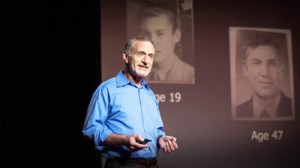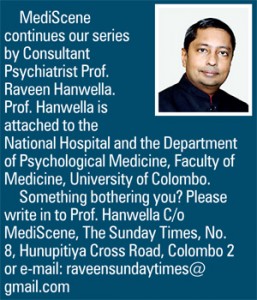Recipe to happiness:A life rich in relationships
Robert Waldinger of Harvard University is probably now the most famous psychiatrist in the world. The TED talk he gave in November 2015 has over four and a half million viewers and the numbers are growing every day. Why did his talk touch the hearts of so many, in such a short time?

Robert Waldinger delivering the TED talk
Waldinger is the current director of the longest study on human development ever undertaken. In 1936, William Grant, businessman and philanthropist, gave Harvard University an initial cheque for 60,000 dollars to fund a study to follow a group of promising Harvard graduates over a lifetime. In his own words what he had in mind was to, “…assist by some means, people… through a better knowledge of how to use and enjoy all the good things the world has to offer them.”
The study was the brainchild of Harvard physician Arlene Bock. Bock, a man of vision, thought that medical research paid too much attention to people who were ill and too little to the important question of how to live happy and well. He was the pioneer of the concept of positive health, a radical idea at the time. This idea would be further developed by Martin Seligman almost six decades later and give birth to a new field called positive psychology. Bock lived what he believed and, until his death at the age of 96, walked two miles a day. He was one of the first doctors to point out that normal does not mean average. Bock was interested in finding not the average fitness but the best possible fitness in humans. To accomplish this it was thought best to study an elite sample of men.
In 1938 Harvard recruited 268 of their male undergraduates beginning one of the longest longitudinal studies in the world. It aimed to find out the factors important for human growth and flourishing. The men, including their close relatives. were subjected to extensive interviews and medical evaluations. It was expected that the study would last around 20 years. But against all odds it has now carried on for more than 75 years.
The longest serving director of the project was George Vaillant who led the study for over 30 years. In 1977 he published his first book Adaptation to Life where he wrote how the men in his study were doing in their 50’s. In 2012 after retiring from the project, in Triumphs of Experience,he described the life of the Harvard men now in their nineties. What did he find?
A key finding was the destructive power of alcohol. In the study, alcoholism was the single most significant cause for divorce. It was also significantly correlated with neurosis and depression which usually followed the alcoholism. With cigarette smoking, alcohol related causes were the main reasons for morbidity and death.
Another interesting finding was that liberal men had better sex lives than conservative men. The conservatives stopped their sex lives when they were in their sixties whereas the liberals continued into their eighties. In Triumphs of Experience, Vaillant emphasises the importance of warm relationships in determining health and happiness in later years. In 2014 Vaillant gave his TED talk which did not get ratings anywhere near that of Waldinger’s. Perhaps it was prosaic and formal compared to Waldinger’s eloquent and brilliant presentation.
In his talk Vaillant took one case to illustrate his key point. The boy was Godfrey Camille, a tall charming red head who planned to be a doctor and seemed a stable personality. But later assessment found him to be a self-centred hypochondriac. His parents were upper class, but socially isolated and pathologically suspicious. Ten years into the study each subject was given a rating from A to E anticipating future personal stability. He scored the worst grade of E. He returned from World War II still a private. After graduating from medical school he attempted suicide. He was a failure. But by the time he was 80, he had become a beloved father and a respected physician in the community. What made the difference?
 At age 35, he was hospitalized for fourteen months in a Veterans’ hospital with pulmonary tuberculosis. Vaillant thought that the love and care he received there made the difference. Camille thought he had a religious experience and had seen Jesus. At age 75 Dr. Camille did not need Jesus or Freud to explain his transformation (Valliant’s words). He has read a children’s book which tells the story of a toy rabbit who wishes to become a real rabbit. In the end the rabbit gets his wish through the love of the boy. He wrote, “I … read that children’s classic The Velveteen Rabbit, which tells us how connectedness is something we must let happen to us, and then we become solid and whole. As the tale recounts tenderly, only love can make us real.”
At age 35, he was hospitalized for fourteen months in a Veterans’ hospital with pulmonary tuberculosis. Vaillant thought that the love and care he received there made the difference. Camille thought he had a religious experience and had seen Jesus. At age 75 Dr. Camille did not need Jesus or Freud to explain his transformation (Valliant’s words). He has read a children’s book which tells the story of a toy rabbit who wishes to become a real rabbit. In the end the rabbit gets his wish through the love of the boy. He wrote, “I … read that children’s classic The Velveteen Rabbit, which tells us how connectedness is something we must let happen to us, and then we become solid and whole. As the tale recounts tenderly, only love can make us real.”
He went on to become a respected physician, an important member of his community and the father of two loving children. He could also beat much younger men at squash. At age 82, Godfrey Camille had a fatal heart attack while climbing the Alps. At his funeral the church was packed. His son speaking at the service said, “He lived a very simple life, but it was very rich in relationships.”
Robert Waldinger has yet to write a book on the Harvard Study but what were his key points? He shares three important lessons. Initially, when the men in the study were asked what they wanted most in life, they said they wanted to be rich, famous or powerful. But the study showed that it was not money, fame or power that keeps people happy. There were three other factors that were more important.
First, close relationships. The men who reported they were close to their family, friends or the community were happier, healthier and lived longer. Second, the quality and quantity of relationships were important. Couples who argued a lot and had low affection for each other were unhappier than those who lived alone. Third, people who had stable and supportive marriages performed better on memory tests than those who were divorced, separated or had serious problems. A good marriage protected the brain from decline.
Waldinger ended his talk with a quotation from Mark Twain who was looking back on his life, “There isn’t time, so brief is life, for bickerings, apologies, heartburnings, callings to account. There is only time for loving, and but an instant, so to speak, for that.”


